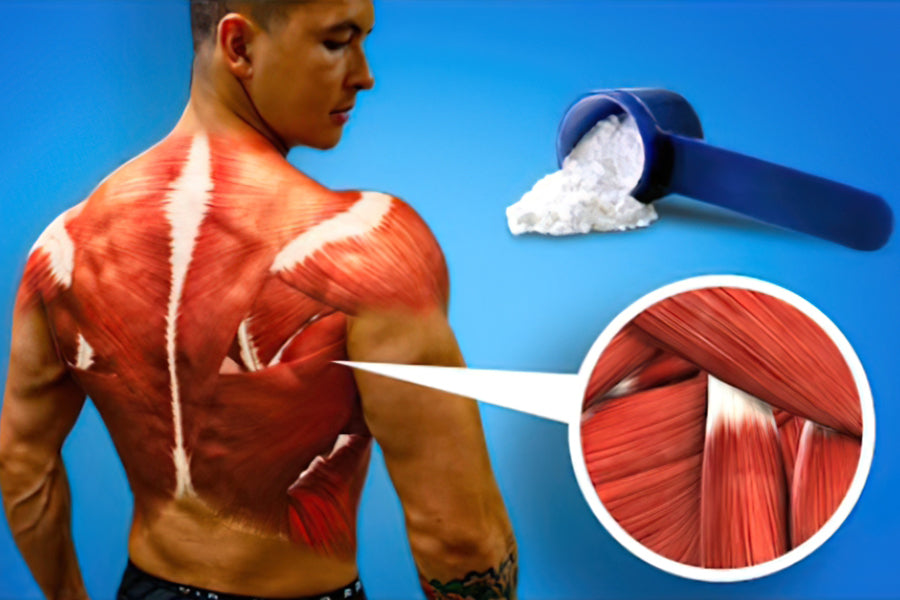If you've heard about creatine, it was probably from a gym buddy or a flashy ad promising muscle gains. So, what’s the hype?
Creatine boosts muscle growth and strength by increasing energy production, allowing you to train harder and longer. Many athletes and fitness enthusiasts rely on the best creatine supplements to maximize their performance and results.
But what happens when you stop taking it? Some may experience reduced muscle mass, strength, or endurance, while others notice no major changes. Let’s dive deeper into how creatine works and what to expect when you quit.
What is Creatine, and How Does it Work?

Creatine is an amino acid supplement that bodybuilders and other athletes have used for years. It’s widely believed to help increase muscle mass and improve athletic performance. But how does creatine actually work?
Creatine is a naturally occurring compound found primarily in skeletal muscle. Smaller amounts are also present in the brain, heart, and testicles. When taken as a supplement, creatine is typically synthesized in the liver and transported to muscle cells, where it is stored.
During exercise, creatine serves as an energy source. When ATP (adenosine triphosphate) levels in muscles drop, creatine is converted to phosphocreatine, which helps replenish ATP. This leads to improved muscular endurance and energy.
Overall, creatine is a safe and effective supplement for enhancing exercise performance and supporting muscle growth.
Creatine is a safe and effective way to improve exercise performance and promote muscle growth.
What Happens When You Stop Taking Creatine?
Creatine supplements are a great way to improve and enhance performance at the gym. Creatine boosts your energy, allowing you to train harder. It also reduces fatigue and improves focus during workouts. But it's an artificial energy source, and obviously, it's not something you can consume indefinitely!
Right? So, how does your body react when its dosage is halted?
The simple answer is that your body will go back to producing energy naturally, just as it did before you started supplementing with creatine. However, your body's creatine stores will be depleted, especially in the muscles and brain. Creatine withdrawal can cause lethargy and tiredness, lasting anywhere from one to two weeks.
The good thing is that you won't necessarily feel the energy loss too intensely. Over time, your body's natural recovery processes will return to normal levels.
Side Effects of Stopping Creatine Dosage

When you stop taking creatine, you can expect to feel some changes. Here are some side effects to be aware of and mentally prepared for:
Weight Loss
When you stop taking creatine, your muscles will retain less water than they did while you were supplementing. As a result, you may experience some weight loss and a slight reduction in muscle mass. However, this change is not drastic and is nothing to be concerned about.
Fatigue
Creatine is an energy-enhancing supplement, so it makes sense that stopping it may leave you feeling less energetic than before.
Let’s break it down. The recommended creatine dosage is 5 grams per day, while your body naturally produces only 1–2 grams daily. Supplementing with creatine enhances ATP production, which boosts energy levels. When you remove that extra 5 grams, you may struggle with your workout routine due to lower energy availability.
The fatigue will likely be more noticeable at first, but over time, your body should adjust.
Loss of Muscle Mass
You may also find that reduced creatine levels make strength training more challenging.
Lifting heavier weights or maintaining your previous rep count may become more challenging. This happens because your body produces less ATP, leading to quicker fatigue. Without creatine supplements, your muscles might struggle to keep up with your usual workout intensity.
Muscle Weakness
You may experience some muscle loss when you stop taking creatine supplements. However, it's important to understand that creatine itself does not directly increase muscle mass, nor does stopping it directly cause muscle loss.
Creatine supplementation boosts energy levels, allowing you to work out longer and with greater intensity. When you stop taking it, your energy levels may decrease, making it harder to maintain the same workout routine. Over time, this reduction in training intensity can lead to a slight loss of muscle mass.
The Best Way to Stop Creatine Dosage
At some point, you may decide to stop taking creatine—perhaps once you've achieved your fitness goals and no longer need the extra boost of energy.
Experts suggest that stopping creatine abruptly may not be ideal. Instead, it's best to gradually reduce your dosage over time. This approach helps minimize potential side effects and allows your body to adjust more smoothly to its natural state.
Pros and Cons of Quitting Creatine
Here’s a quick look at the pros and cons of quitting creatine:
Pros |
Cons |
Creatine supplements aren’t cheap. If you’re on a budget, quitting creatine can free up some extra cash for other essentials, like workout gear or high-quality nutrition. |
Creatine supports muscle growth by increasing ATP production. If you stop taking it without adjusting your workout and diet, you may experience a slight loss in muscle mass. |
There’s no evidence to suggest that stopping creatine will cause extreme withdrawal symptoms. Your body will gradually adjust to producing creatine naturally. |
Since creatine boosts energy during workouts, stopping it might leave you feeling more fatigued, especially in high-intensity training sessions. |
Creatine causes water retention in muscles, which can make you look slightly bloated. Stopping it may result in a leaner, more defined appearance. |
Some people report feeling tired, irritable, or even mildly depressed after stopping creatine, though this effect varies from person to person. |
Some individuals experience bloating, stomach cramps, or digestive issues while taking creatine. Quitting may eliminate these side effects. |
Without creatine, your muscles may fatigue faster, making it harder to lift heavy weights or sustain intense workouts. |
FAQs
1. Does taking creatine cause water weight gain?
Yes, creatine causes your muscles to retain water, leading to quick weight gain and a slightly bloated or puffy appearance, particularly in areas like your arms, legs, and stomach. Even if you're new to training, your muscles may appear larger due to increased water retention. This fast, visible effect is one of the reasons creatine is a highly valued supplement.
2. Do you lose the benefits of creatine when you stop taking it?
Creatine itself doesn’t directly build muscle—it boosts ATP energy production, allowing you to work out longer and harder, which can lead to increased muscle mass. When you stop taking creatine, your energy levels and workout performance may decrease. You might also lose the water weight gained while using creatine, but you won't necessarily lose the muscle you've built through training.
3. How long can you safely take creatine?
Creatine is considered safe for long-term use. Studies have shown that doses of up to 10 grams per day for five years have been safely consumed. Lower doses of 4–5 grams daily for 18 months have also been deemed safe. The highest reported safe intake is 25 grams per day for 14 days.
4. How much creatine do you need for results?
A typical dose is 3–5 grams per day, which is sufficient for most individuals. Some people follow a loading phase by taking 20 grams daily for five days to saturate their muscles with creatine more quickly, leading to faster results.
Conclusion
If you're considering trying creatine, there are a few things you should know first. Creatine is a supplement that enhances muscle growth and strength by boosting your muscles' energy production.
However, if you suddenly stop taking creatine, you may experience temporary side effects like fatigue and reduced energy levels during workouts. To minimize these effects, it's best to gradually reduce your dosage rather than stopping abruptly. This allows your body to adjust naturally and maintain a steady energy balance.
Reading List
Article Sources
- Kurosawa, Yuko, et al. ‘Creatine Supplementation Enhances Anaerobic ATP Synthesis during a Single 10 Sec Maximal Handgrip Exercise’. Molecular and Cellular Biochemistry, vol. 244, no. 1–2, Feb. 2003, pp. 105–12.

















